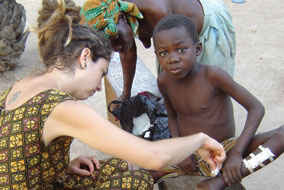
UBC nursing grad Chloe Lemire-Elmore treats a young Ghanian
patient UBC Reports | Vol. 52 | No. 1 | Jan. 9, 2006
Africa’s Top Health Challenges
Nursing students learn on front lines
By Hilary Thomson
Impromptu ukulele concerts and munching mangoes by moonlight may seem like scenes from a carefree holiday. In fact, they represent the work experiences of UBC School of Nursing students who have created clinical practicums in Africa.
As part of a fourth-year clinical course called Exploring Avenues of Nursing Practice, Nash Dhalla and Sarah Rohde have just headed to South Africa to spend six weeks at urban hospitals and rural clinics.
The clinical experiences can focus on various avenues of practice such as mental health and pain management. Dhalla and Rohde have organized a clinical rotation that explores prevention and care for people living with HIV/AIDS in the Eastern Cape, one of South Africa’s poorest provinces, where more than 20 per cent of the population has HIV.
“The huge incidence of the disease can seem overwhelming, but I believe it’s possible to make a difference,” says 39-year-old Dhalla, who worked for nine years as a TB outreach worker in Vancouver’s Downtown Eastside where many patients also had HIV/AIDS. “My experience has shown me that supportive health care -- literally bringing health-care services to people on the street -- can work.”
Both students have an international perspective.
Dhalla, who was born in Uganda, holds an undergraduate degree in international development and found the shift to nursing care for marginalized populations to be a logical transition. Rohde was raised in Indonesia, Haiti and Delhi, and completed a degree in history at the School of Oriental and African Studies in London. She returned to India to work with refugees before enrolling in UBC’s School of Nursing. Her family now lives in East London in the Eastern Cape and will host the students during their stay.
The pair hopes to better understand the role of the community health nurse in educating, counseling and caring for people with HIV/AIDS.
“I believe HIV is a defining epidemic of our generation and the opportunity to work alongside South African nurses on both prevention and care is a unique one,” says the 31-year-old Rohde, who intends to eventually return overseas to work in public health. “I hope this experience will both give me a perspective on a worldwide health crisis and provide me with skills to work in any setting where this epidemic is critical -- which is so many parts of the world.”
To facilitate the clinical experience, UBC’s School of Nursing has collaborated with the School of Nursing at the University of Fort Hare in the Eastern Cape. Dhalla and Rohde will work with fellow nursing students at two teaching hospitals in East London, and associated urban and rural clinics. They will also work with women’s groups in the affected communities and assist nurses in remote rural clinics.
In addition, they will help bring health-care services to villagers living on the Eastern Cape coast by getting on board the Phelophepa Health Train that carries a multidisciplinary team to remote sites.
Dhalla and Rohde will work with an HIV health-care team to help prevent mother-to-child transmission of HIV, support patients receiving antiretroviral therapy and will work to understand how traditional Xhosa healing beliefs affect treatment of the epidemic.
This year’s trip was inspired, in part, by the experience of four fellow UBC Nursing students who traveled to Africa in May 2005. The foursome had significant individual health and development experiences in Brazil, Mali and India, and were based in a small village in East Ghana. They did clinical work, in some cases walking miles to visit patients immobilized by their illness, and offered community health education sessions.
“Music was a keystone part of our teaching,” says School of Nursing graduate Chloe Lemire-Elmore. “I brought a ukulele with me, and for every topic we taught, we composed a catchy song in the local language for our ‘students’ to sing along with us to reinforce the message.”
She says one of the challenges was that villagers looked to the four students as health-care experts in all areas because there was no doctor on site. It put them in a “very awkward and ethically challenging position,” she says, but they responded by using textbooks extensively, relying on local health-care providers’ own knowledge and working together on every case.
The international coursework in Africa has created additional global connections for the School of Nursing, which also has a well-established partnership with Guru Nanak College of Nursing in Punjab state, India.
“Our students are very enthusiastic about contributing their knowledge and competencies in a global context -- they are showing amazing initiative and passion,” says Marion Clauson, associate director of UBC Nursing undergraduate programs.
Those wishing to support Dhalla and Rohde’s trip may contact them at ndhalla@yahoo.com.
Nursing grad Chloe Lemire-Elmore describes a highlight of her clinical rotation in a Ghanian village:
“The music, the dancing, the children, the magical simplicity of village life, lantern lit by night, drumming and chanting in the distance as we fell asleep, the luscious ripe mangoes, the people, definitely the people, the people. The bond that developed between them and us, as well as between us -- living through such a magical, challenging and inspiring experience.” |
